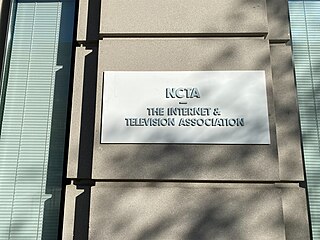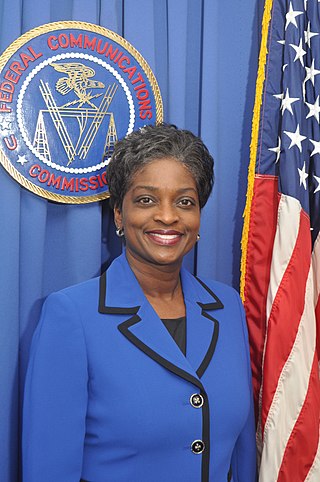
The Federal Communications Commission (FCC) is an independent agency of the United States federal government that regulates communications by radio, television, wire, satellite, and cable across the United States. The FCC maintains jurisdiction over the areas of broadband access, fair competition, radio frequency use, media responsibility, public safety, and homeland security.

An Internet service provider (ISP) is an organization that provides services for accessing, using, managing, or participating in the Internet. ISPs can be organized in various forms, such as commercial, community-owned, non-profit, or otherwise privately owned.

In telecommunications, broadband is the wide-bandwidth data transmission that transports multiple signals at a wide range of frequencies and Internet traffic types, which enables messages to be sent simultaneously and is used in fast internet connections. The medium can be coaxial cable, optical fiber, wireless Internet (radio), twisted pair, or satellite.

Network neutrality, often referred to as net neutrality, is the principle that Internet service providers (ISPs) must treat all Internet communications equally, offering users and online content providers consistent rates irrespective of content, website, platform, application, type of equipment, source address, destination address, or method of communication.
Municipal broadband, sometimes referred to as a "Government-owned Network" or GON, is broadband Internet access offered by public entities. Services are often provided either fully or partially by local governments to residents within certain areas or jurisdictions. Common connection technologies include unlicensed wireless, licensed wireless, and fiber optic cable. Many cities that previously deployed Wi-Fi based solutions, like Comcast and Charter Spectrum, are switching to municipal broadband. Municipal fiber-to-the-home networks are becoming more prominent because of increased demand for modern audio and video applications, which are increasing bandwidth requirements by 40% per year. Supporters of municipal broadband argue that when cities create their own internet and broadband, customers ultimately get faster internet speeds, lower prices, and better customer service than from internet service providers. The purpose of municipal broadband is to provide internet access to those who cannot afford internet from internet service providers and local governments are increasingly investing in said services for their communities.

NCTA – The Internet & Television Association, formerly known as the National Cable & Telecommunications Association (NCTA), is a prominent trade association representing the American broadband and pay television industries. As of 2011, the NCTA encompassed more than 90% of the U.S. cable market, over 200 cable networks, and various equipment suppliers and service providers to the cable industry.
The Universal Service Fund (USF) is a system of telecommunications subsidies and fees managed by the United States Federal Communications Commission (FCC) intended to promote universal access to telecommunications services in the United States. The FCC established the fund in 1997 in compliance with the Telecommunications Act of 1996. The FCC is a government agency that implements and enforces telecommunications regulations across the U.S. and its territories. The Universal Service Fund's budget ranges from $5–8 billion per year depending on the needs of the telecommunications providers. These needs include the cost to maintain the hardware needed for their services and the services themselves. The total 2019 proposed budget for the USF was $8.4 billion. The budget is revised quarterly allowing the service providers to accurately estimate their costs. As of 2019, roughly 60% of the USF budget was put towards “high-cost” areas, 19% went to libraries and schools, 13% was for low income areas, and 8% was for rural health care. In 2019 the rate for the USF budget was 24.4% of a telecom company's interstate and international end-user revenues.
In the United States, net neutrality, the principle that Internet service providers (ISPs) treat all data on the Internet the same, and not discriminate, has been an issue of contention between network users and access providers since the 1990s. With net neutrality, ISPs may not intentionally block, slow down, or charge money for specific online content. Without net neutrality, ISPs may prioritize certain types of traffic, meter others, or potentially block traffic from specific services, while charging consumers for various tiers of service.

Free Press is a United States advocacy group that is part of the media reform or media democracy movement. Their mission includes, "saving Net Neutrality, achieving affordable internet access for all, uplifting the voices of people of color in the media, challenging old and new media gatekeepers to serve the public interest, ending unwarranted surveillance, defending press freedom and reimagining local journalism." The group is a major supporter of net neutrality.

The Internet in the United States grew out of the ARPANET, a network sponsored by the Advanced Research Projects Agency of the U.S. Department of Defense during the 1960s. The Internet in the United States in turn provided the foundation for the worldwide Internet of today.
In telecommunications, white spaces refer to radio frequencies allocated to a broadcasting service but not used locally. National and international bodies assign frequencies for specific uses and, in most cases, license the rights to broadcast over these frequencies. This frequency allocation process creates a bandplan which for technical reasons assigns white space between used radio bands or channels to avoid interference. In this case, while the frequencies are unused, they have been specifically assigned for a purpose, such as a guard band. Most commonly however, these white spaces exist naturally between used channels, since assigning nearby transmissions to immediately adjacent channels will cause destructive interference to both.
Rural Internet describes the characteristics of Internet service in rural areas, which are settled places outside towns and cities. Inhabitants live in villages, hamlets, on farms and in other isolated houses. Mountains and other terrain can impede rural Internet access.

Mignon Letitia Clyburn is an American former government official who served as a member of the Federal Communications Commission (FCC) from 2009 to 2018.
Access Humboldt is a non-profit, community media organization formed in April 2006. It is a provider of Public-access television and FM Radio, operating from Humboldt County, California. It was initially formed to manage local cable franchise benefits on behalf of the County of Humboldt, California and the Cities of Eureka, Arcata, Fortuna, Rio Dell, Ferndale and Blue Lake. The community media center is based at the Eureka High School campus in Eureka, California. Access Humboldt seeks to deliver local voices via community media and is an active advocate in issues of community debate.
Net bias is the counter-principle to net neutrality, which indicates differentiation or discrimination of price and the quality of content or applications on the Internet by ISPs. Similar terms include data discrimination, digital redlining, and network management.

Ajit Varadaraj Pai is an American lawyer who served as chairman of the Federal Communications Commission (FCC) from 2017 to 2021. He has been a partner at the private-equity firm Searchlight Capital since April 2021.

Jessica Rosenworcel is an American attorney serving as a member and chairwoman of the Federal Communications Commission (FCC). She originally served on the FCC from May 11, 2012, to January 3, 2017, and was confirmed by the Senate for an additional term on August 3, 2017. Subsequently, she was named to serve as acting chair in January 2021, designated permanent chair in October 2021, and confirmed as such by the Senate in December 2021. Rosenworcel's term runs for five years beginning July 1, 2020.
The 2016 United States wireless spectrum auction, officially known as Auction 1001, allocated approximately 100 MHz of the United States Ultra High Frequency (UHF) spectrum formerly allocated to UHF television in the 600 MHz band. The spectrum auction and subsequent reallocations were authorized by Title VI of the payroll tax cut extension passed by the United States Congress on February 17, 2012.

Brendan Thomas Carr is an American lawyer who has served as a member of the Federal Communications Commission (FCC) since 2017. Appointed to the position by Donald Trump, Carr previously served as the agency's general counsel and as an aide to FCC commissioner Ajit Pai. In private practice, Carr formerly worked as a telecommunications attorney at Wiley Rein.
Digital redlining is the practice of creating and perpetuating inequities between already marginalized groups specifically through the use of digital technologies, digital content, and the internet. The concept of digital redlining is an extension of the practice of redlining in housing discrimination, a historical legal practice in the United States and Canada dating back to the 1930s where red lines were drawn on maps to indicate poor and primarily black neighborhoods that were deemed unsuitable for loans or further development, which created great economic disparities between neighborhoods. The term was popularized by Dr. Chris Gilliard, a privacy scholar, who defines digital redlining as "the creation and maintenance of tech practices, policies, pedagogies, and investment decisions that enforce class boundaries and discriminate against specific groups".











